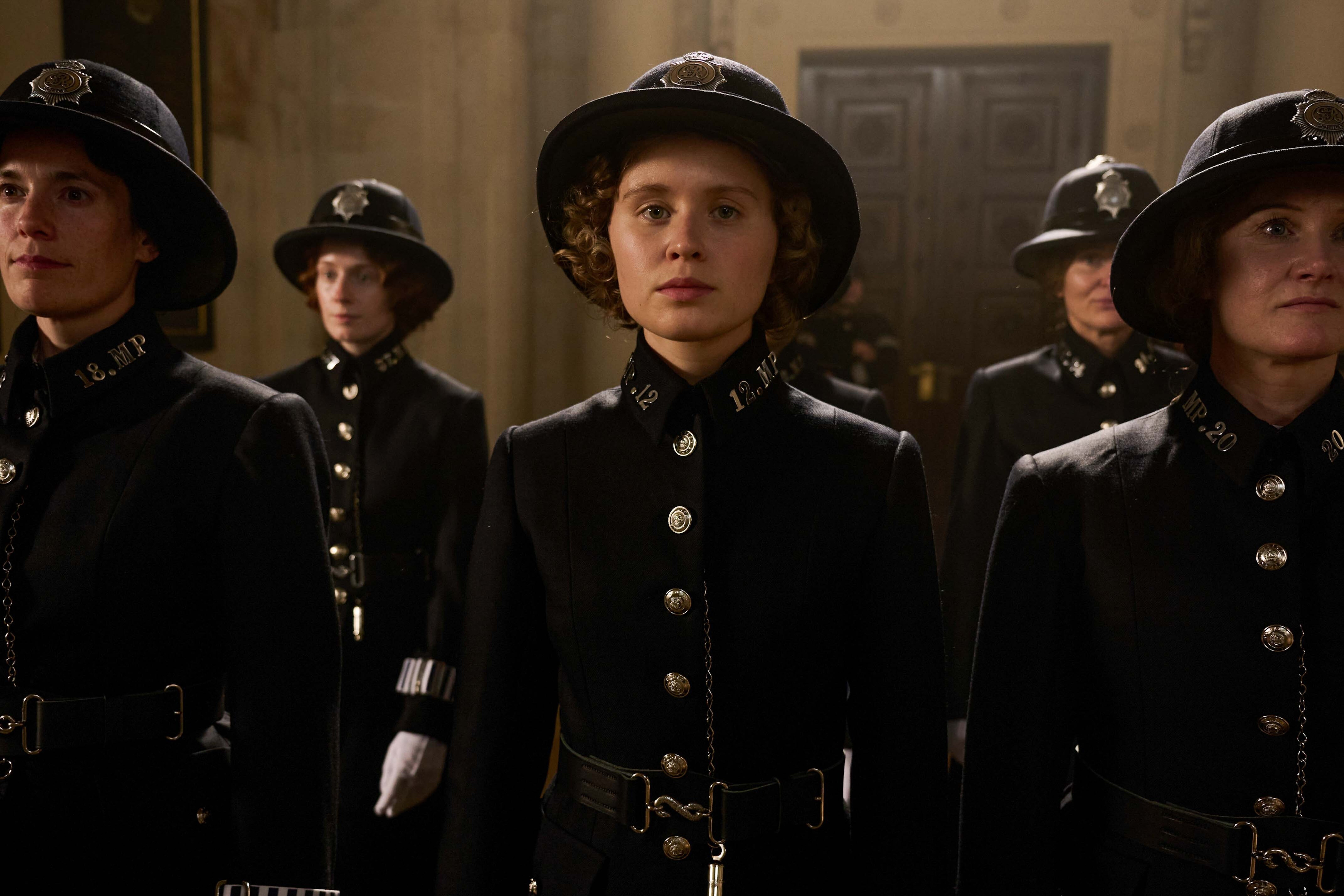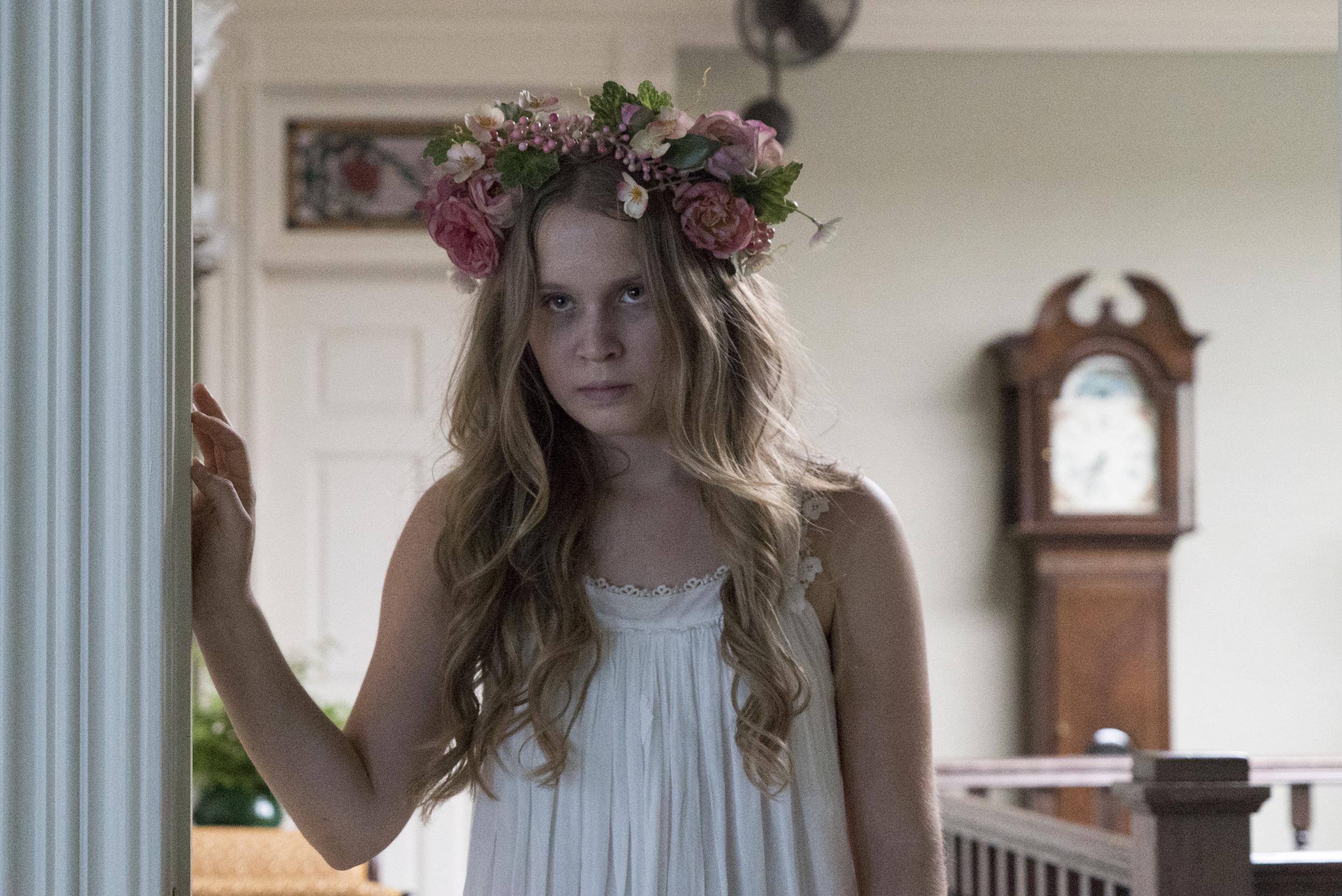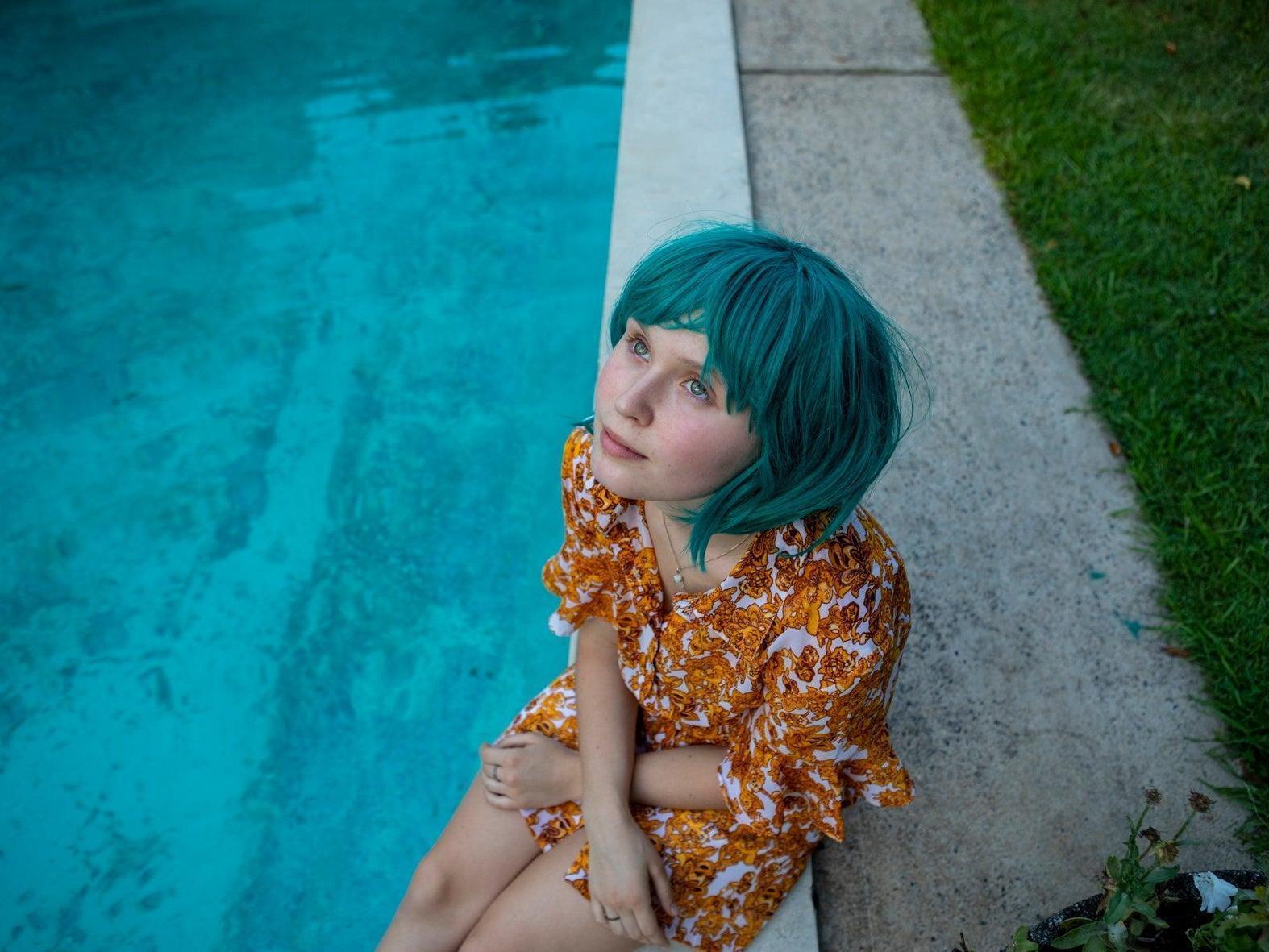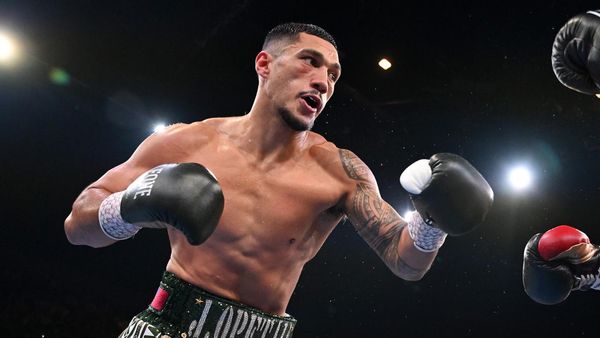
Eliza Scanlen wasn’t technically a child when she became a star. The Australian actor had just turned 18 when she landed her breakout role as Amy Adams’ feral baby-doll sister in HBO’s hit series Sharp Objects – but looking back now, she knows she could’ve done with a few more years under her belt.
“It all happened when I was quite young,” Scanlen says today, still only 26. “I wasn’t really prepared for that kind of attention and when something like that happens, once you get a break, there is this pressure to take advantage of that momentum and run with it. I found it very overwhelming and in some ways, I withdrew – whereas if I was a bit older, I’d have been more confident and ready.” You get the sense that even now, with tentpoles like Little Women, M Night Shyamalan’s Old, and now BBC’s sure-fire hit Dope Girls, to her name, Scanlen is not particularly suited to the discomforts of fame.
This chimes with the person that I meet today, who is happily without pretence or affect – or even a handbag. Scanlen arrives in a black puffer jacket and a denim button-up shirt. We both apologise awkwardly when she goes for a hug at the same time as I stick out my hand. It’s all very un-Hollywood, which is how she likes it. The idea of moving to LA elicits a groan; living in London, she says, is a nice middle-ground between her remote home of Australia and the industry den of California.
Scanlen grew up in Sydney with a twin sister (also called Annabel; “Same spelling as yours!” she says) and an older brother. Her parents co-founded Storage King, a successful storage facility business in the city. While at school, she started taking weekend classes at Nida, the performing arts college whose alumni include Sarah Snook and Cate Blanchett. No one in her family, bar a second cousin once removed who she heard was a screenwriter, knew a thing about acting. There was no visible route in, and yet equally there was no plan B. “It’s that beautiful age where you don’t have self-doubt,” she laughs. “I was like, this is easy!”
As is the trodden path for Australian actors – Margot Robbie, Heath Ledger, the Hemsworth brothers – Scanlen got her start on soaps. She was 17 and in her final year of school when she played an angel-faced stalker on Home and Away. “I got to the green room one day and the scripts had come through and they said I had to kiss someone,” she says. “I absolutely freaked out. I was terrified. I almost quit acting.” In the end, she got through it; now her barometer for taking a job is how much it scares her. “It sounds masochistic, but the more scary it is, the more satisfying.”
That first guest part on Home and Away identified in Scanlen something directors would go on to utilise throughout her career. These days, she continues to land roles that play on her perceived sweetness and ability to flip it as fast as a switchblade, because while it’s easy to compare her short crop of blonde curls to a halo, infinitely more interesting is the sinister curl of her lips.
Shades of that brattish performance served her similarly well on stage in last year’s highly acclaimed, high-camp production of The Importance of Being Earnest. Other times the multitudes are more subtle, as in 2023’s The Starling Girl, in which she plays a 17-year-old girl whose religious foundations are shaken when she begins a transgressive romance with her handsome 28-year-old youth pastor.
There’s duplicity in her latest role, too, in BBC’s Dope Girls, which stars Julianne Nicholson as the aspiring owner of a nightclub in 20th-century London. Scanlen plays Violet, one of Britain’s first women police officers, who is sent under cover into the underbelly of Soho. Nasty and delicious, the series has been hailed a “spiritual successor” to Peaky Blinders. In preparation for her part, Scanlen listened to Siobhan Finneran’s podcast, trying to emulate the actor’s northern accent. It’s the hardest accent she’s done yet, which is saying something given how little she gets to use her natural Australian lilt.

Beyond that, Scanlen tried not to study too hard for the part as she has been wont to do in the past. “I tend to use research as a crutch to allay my anxiety about a job if I worry that I’m going to be bad,” she says. “In recent years, I‘ve realised that it can be quite stifling. Obviously there are some historical elements that inform your acting, but those things can get in the way sometimes.” As Violet, Scanlen doubles down on the menace of her earlier roles, more blatantly ruthless and self-possessed. On screen, it’s clear she’s savouring the change. “I’m at this weird age, too, where I’m 26 now but I’m still getting jobs for 17-year-old girls who have never kissed someone,” she says. “I love coming-of-age stories, but it is starting to feel further and further away.”
With age has come confidence, which isn’t to say that Scanlen wasn’t savvy early on. When she arrived at the screen test for Sharp Objects fresh from Schoolies (a week of hard partying that is a rite of passage for Australian students after sitting their final exams), her voice was hoarse and ragged. “The first thing Jean-Marc [Vallée] says is, ‘Shit, your voice sounds really different…’” says Scanlen, cringing at the memory. In the end, she played it off as some sort of character immersion. “I told him, ‘You know, I’m crazy. I party hard like [my character] Amma!’ So it ended up being fine in the end.”
Sharp Objects was a ride, adds Scanlen. “I remember the day of the premiere being so overwhelmed by the whole spectacle,” she says. “I thought, I can’t do this. I was also meeting Greta [Gerwig] on that trip for a screen test for Little Women, and this press release came out like… ‘Little Women circling Eliza Scanlen.’ It was very bizarre. I wasn’t quite prepared for it and I don’t think I really understood the enormity of what was happening; it was quite scary.”

The screen test went well regardless and she landed the part of Beth, turning in a suitably cherubic, butter-wouldn’t-melt performance as the scarlet fever-stricken March sister. But the fear didn’t go away – and it’s something her Little Women co-star Saoirse Ronan noticed, too.
“I was chatting with Saoirse’s mum recently and we were reminiscing about that time, and she said to me that Saoirse came home one day after doing rehearsals and rang her mum, and she said, ‘Mum I’ve met this girl who is playing Beth, and I think I need to look after her on this film. I think I need to look out for her.’ And that’s exactly what she did,” recalls Scanlen. “I think she saw herself in me at that age and she knew how the industry can be.” Today, they’re close friends. “Whenever I have a problem or am not sure about something, she’s the person I go to,” Scanlen smiles. “Also, when I just feel f**ked off with the industry.” Her friendship with Kiwi actor Thomasin McKenzie, too, has proven another port in the storm.
It sounds masochistic, but the more scary it is, the more satisfying
Still, Scanlen came out of Little Women overwhelmed and homesick. When she got the script for an indie drama called Babyteeth, shooting in her hometown of Sydney, she took it. “I just wanted to go home at that point,” she says. “Also I loved the script. I knew I had to do it. My agents were like, ‘Really? Are you sure this is the right move?’ For some reason, I was sure of myself.” It was the right decision. Anyone who has seen Babyteeth, in which Scanlen plays a schoolgirl with cancer who falls in love with a drug dealer, will attest to its charms.
Scanlen shaved her head for the part. “I should do it again!” she exclaims. “We all hide behind our hair to make us feel feminine and when you don’t have that any more, there’s no way to hide and it’s so freeing.” It changes, too, how casting agents see you. “We’re so typecast on our appearance,” says Scanlen. “I tend to get ‘shy quirky girl’ a lot, and I think having short hair definitely helped change that. Sometimes people aren’t that imaginative. A lot of the time, when they’re trying to cast things, they’re looking for a ‘look’ rather than a performance.” It’s worth noting that Scanlen’s latest role as Violet in Dope Girls is anything but shy; she also has hair shorn above the shoulders.
-in-The-Importance-of-Being-Earnest-at-the-National-Theatre-(c)-Marc-Brenner-2.jpg)
When she eventually did make her way back to Hollywood two years later, in Netflix’s southern gothic thriller The Devil All the Time, Scanlan was more self-possessed because of her experience on Little Women. “I spent three months surrounded by so many intelligent, strong-minded women and so I had more confidence in the questions I was asking,” she says. (Fun fact: “I almost lost out on the role because I was practically still bald from Babyteeth, and Antonio [Campos, the director] had a bad experience with wigs!”)
And what about Robert Pattinson, whose wild, wicked performance as a Southern preacher sparked rumours of method acting? Scanlen laughs. “It’s so funny,” she says. “He wasn’t really method; we’d always be laughing between every take. He was quite uncomfortable about having to groom us – but he’s really sweet. He’s one of the least serious people I’ve ever worked with.”

Scanlen does make a serious point about method acting, however, agreeing with Natalie Portman who once said it’s a luxury women can’t afford. “We’re not given the grace to do that kind of thing,” she says. “We tend to give excuses, more excuses, for men’s behaviour than we do for women.”
As someone who has scaled all the rungs of a call sheet, Scanlen is in a well-placed position to say that sets are a “grossly” hierarchical place. “And at the top, when you wield that kind of power, it comes with responsibility, so if you see something it’s up to you to speak up about it,” she says. “I’ve definitely had experiences where I’ve been on the bottom rung as an actor and it’s very disempowering; there was a pressure to just get in and out and not cause any trouble.” Scanlen says she has spoken up previously on behalf of herself and others. “I’m trying to get better at not sitting on it for so long,” she says. “When you see it, you need to have the confidence to say it in the moment.”
‘Dope Girls’ will begin airing on BBC One on 22 February, with all episodes available to stream on iPlayer







